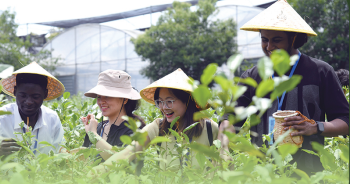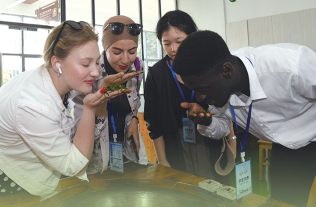2024-06-05
Sowing seeds of understanding
On May 18-19, over 130 students and teachers from 19 universities in East China's Jiangsu province embarked on a two-day trip to Zhenjiang, a city in Jiangsu. These students hailed from 31 countries, including the UK, Russia, Spain, France, Vietnam, Australia, and China.

During the two-day event, they immersed themselves in China's agricultural history and learned about its modern farming techniques.
For Anne Lauren Beer, a 22-year-old UK student at Xi'an Jiaotong-Liverpool University in Suzhou, the trip provided a glimpse into the charm of contemporary rural China. At a "smart" mushroom planting base, Beer witnessed how 5G technology enables the automated control of optimal mushroom-growing conditions.
The students were also invited to pick and cook mushrooms on-site, savoring the flavor when it was at its freshest. "I'm not usually a fan of mushrooms and sometimes find them unappealing, but these ones were so good. It was hard not to love them," Beer said.
As an environmental science student, Beer observed that modern agriculture in China retains the benefits of traditional practices while emphasizing environmental conservation. At an organic farm, she saw how local farmers had adapted traditions to incorporate sustainable practices, such as avoiding pesticides and ensuring crop health through diverse seeds and technical methods.
"It's a great way to preserve cultural heritage and sustain agriculture as an occupation. This is also good for the environment," she said.
Angelina Lisovenko, a 20-year-old Russian student at Jiangsu University, gained new insights into Chinese agricultural traditions, and she pointed out the significance of agriculture in both Russian and Chinese cultures and economies.
"China has adopted modern agricultural technologies, including precision farming and biotechnology, more rapidly than Russia," she said.
Koffi Paul Arnaud Yao, a 24-year-old pharmacy student from Ivory Coast studying at Changzhou University, noted that both his home country and China cultivate a variety of crops. "In Ivory Coast, we mainly grow export crops such as cocoa and coffee, while China places a high priority on food security, emphasizing crops like rice and wheat," he explained.
In addition to learning about modern agricultural technology, international students also explored a unique aspect of Chinese agricultural civilization: tea culture.


During the trip, they had the opportunity to engage in tea leaf picking and observe the entire tea production process.
Yao was impressed by the art of tea processing. Before this trip, he was unaware of the steps involved in transforming tea from freshly picked leaves to the final product available in stores. "Learning all those steps was truly fascinating to me," he said.
For Raul Sanchez Sanchez, a 20-year-old Spanish student at Nanjing Polytechnic Institute, this hands-on experience greatly deepened his understanding of Chinese tea culture, which he had previously known only through his culture classes. "I realized that you learn more from firsthand experiences than by attending class," he said.
Sanchez was also moved by the locals' dedication and enthusiasm in sharing their tea culture with international visitors. "They conveyed their love and pride for their culture," he said. "I believe that a passionate person can teach better than anyone else."
Of all the steps in the tea production process, fixation, or shaqing — which literally means "to kill green" — stood out as particularly captivating for these young people. During this process, fresh tea leaves are placed in a high-temperature wok and manually stirred to reduce moisture content, halting fermentation, and preserving the tea's essence.
"The temperature in the wok was very high, but the professional used his bare hands, stirring quickly and precisely. It was truly impressive," said Ngo Luu Ngoc Lanh, a 25-year-old Vietnamese student at Jiangsu University.
To Chinese students, who are accustomed to tea being an integral part of their culture, the reactions of international students to tea production seemed to be more intriguing than the process itself. According to Luo Linpeng, 24, a Chinese student at Jiangsu University, he and his Chinese peers frequently asked the international students whether tea was popular in their countries.
For example, Lanh shared with Luo that Vietnam, the world's fifth-largest tea producer and exporter, has significant sales of green tea and oolong tea in Southeast Asia. "Vietnamese people also love drinking tea, and we have a longstanding tea culture. However, unlike the Chinese habit of drinking hot tea, many Vietnamese prefer it cold," she explained.
Lisovenko said that tea was introduced to Russia from China in the 17th century and quickly became a popular beverage. She observed that both cultures value the social aspect of tea drinking, but their preferences differ.
"Russians typically drink black tea, while Chinese people drink a wider variety of teas, including green tea, white tea, and oolong tea," she said. "Additionally, Russians often add sugar or honey to their tea, while Chinese people typically drink their tea plain."
These young individuals also organized an evening event where they recited Chinese poems about agriculture. The event took place at a local farm. Luo observed that many farmers, having finished their day's work in the fields, brought their families to join the audience.
"It was truly a beautiful scene: people of all ages, from different cultural backgrounds and various identities, immersing themselves in China's thousands of years of agricultural civilization," he said.
This is probably why Sanchez believes that these exchange activities are so important. "They helped us understand China, its culture, its way of thinking, and how the locals express themselves. More importantly, they taught us how to learn from and respect other cultures," he said.
文章来源:China Daily 2024年6月5日
文章链接:https://www.chinadaily.com.cn/a/202406/05/WS665fa507a31082fc043caea3_3.html
来华留学相关报道
联系我们
08:30-11:30 | 14:00-17:00
招生办: +86-511-88792366
学工办: +86-511-88792566
教务办: +86-511-88792216
江苏省镇江市京口区学府路301号




